BERLIN – Throughout the summer, Angela Merkel’s election rallies have been accompanied by small groups of far-right hecklers. Her campaign stop in Heidelberg, a town in southwest Germany, on a warm afternoon in early September, is no different.
A few dozen protesters are scattered around Universitätsplatz as Merkel takes to the stage. Some shout “Merkel must go”. They call her a traitor. Others blow whistles in an attempt to disrupt her speech. “Vote for Merkel – Count the Bodies,” a homemade sign reads. Another says “Close the Borders – End the Asylum Madness”.
Unfazed, Merkel responds by thanking people "who have helped refugees and don’t scream". If there has been a mistake, she tells the 3,000 people that have gathered on the square to listen to her, it was not in letting people in – but in taking too little care to improve the situation in the refugees’ countries. “Diversity makes us strong against the storms raining down on us,” Merkel says.
Some attendees confront the protesters: “You have the right to demonstrate, but we are entitled to democracy when we want to listen to the speech!” 18-year-old Mirjam Taufenbach tells a particularly loud demonstrator.
Among the crowd gathered in the square are many young people. Heidelberg is home to Germany’s oldest university, and roughly a quarter of the town’s 155,000 residents are students.
“After the speech, I have the feeling that I know for sure that I want to vote for her,” Lena Büttner, a first-time voter, says.
This Sunday, Germans will vote in federal elections, which, if the latest polls are accurate, are likely to see Merkel comfortably secure a fourth term as chancellor. And according to those same polls, it is the support of the vast majority of young voters – people like Buttner and her friends – that will help carry her to victory.
Under Merkel's leadership, the conservative Christian Democratic Union has become Germany’s most popular political party among young people, and her personal ratings are at their highest with first-time voters. Previous nonvoters and young first-timers were crucial factors in a hat-trick of CDU state election wins earlier this year.
A poll published in June showed that 57% of 18- to 21-year-old Germans backed Merkel as chancellor over her main opponent, the Social Democrat Martin Schulz, a higher score than Merkel’s 53% among all voters.
In a world where political careers sometimes can be measured in days or weeks, Merkel has proven to be the exception. The journey that led her to the chancellorship in 2005 was unexpected. Many, both in Germany and abroad, thought a woman, and an Easterner, couldn’t make it at the top of male-dominated German politics – let alone last so long. They were wrong. That she is now on course for a fourth term is testament to her ability to continuously extend her party’s appeal beyond its conservative, and older, base.
Her economic record in office, her tactics, and her image of stability in an unstable world only go so far in explaining Merkel’s continued popularity after 12 years in Europe’s most powerful job.
Much more important is that she is viewed as authentic by a new generation of voters who value authenticity in politicians above all else.
“She is real! She stands up for what she says and prevails against her party, saying: ‘We’ll do this now, even if you oppose it,’” Taufenbach tells BuzzFeed News when asked why she is voting for Merkel.
The 18-year old adds: “She is an example for other women – and that I find marvellous.”
Another 24-year old student, Tabea Wegener, who voted for the Social Democratic Party (SPD) in 2013, tells BuzzFeed News that this year she will most likely vote for the CDU. “Merkel is the main reason” for the switch, she says.
Even many of those who will not be voting for the CDU praise her. Physics student Patrick Schygulla applauds Merkel as she talks about her actions during the refugee crisis.
“I personally do not vote for CDU, but I give Merkel great credit for standing up against the storm during the refugee crisis,” the 25-year old says after the chancellor’s speech.
“I think Merkel is a great politician. But she’s in the wrong party.”
There is one issue above all others that has cemented Merkel’s appeal to young Germans: her handling of the refugee crisis.
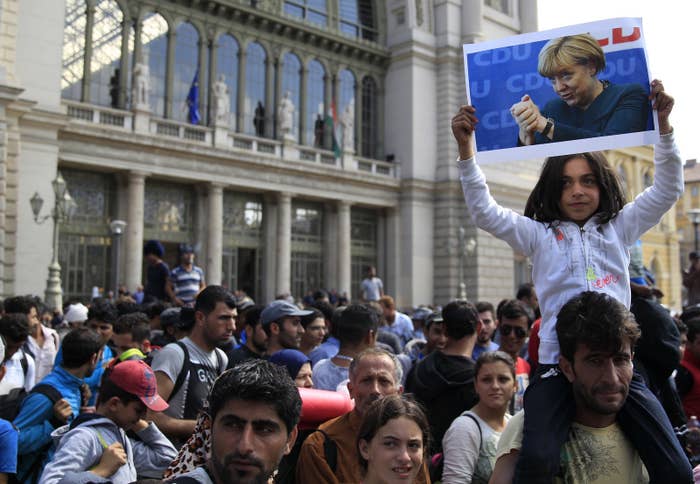
In July 2015, during a forum for young people, Merkel was strongly criticised after failing to console a young Palestinian girl threatened with deportation.
Merkel told the young refugee that not everyone could stay in Germany, and that “some will have to go home”. Merkel then stroked the girl, who was by then crying, on the back.
The term #Merkelstreichelt (Merkel strokes) trended on Twitter shortly after the incident was broadcast.
A couple of months later, Merkel made the most consequential call of her tenure so far: She opened Germany’s doors to more than 1 million refugees.
#Merkelstreichelt became #RefugeesWelcome.
“Wir schaffen das” ("We will cope"), Merkel said.
It is that decision to welcome refugees that lies behind her popularity with young people.
“I agree with Merkel’s statement ‘Wir schaffen das’ concerning the refugee crisis. We try to do what is in our power to help people because our country thrives,” Taufenbach says.
Merkel has described the decision as both humanitarian and political.
Although hundreds of thousands of refugees had already made their way to Germany since the previous summer, September 2015 was a turning point. When Hungary blocked trains from leaving Budapest’s main station, tens of thousands of people were forced to attempt a journey by foot, through streets, highways, and fields. Catastrophe was looming, and Merkel felt she had to act.
The symbolism of Keleti train station in Budapest, where East Germans unable to travel west under Communism would attempt to meet friends and relatives, wasn’t lost on her, allies claim.
Although she acknowledges that Germany and Europe didn’t pay enough attention to the conditions that led to the crisis and were inadequately prepared for such a high and sudden influx of people, Merkel remains adamant that she did the right thing – and would make the same call again.
“I’d make all the important decisions of 2015 the same way again,“ Merkel said during an interview with a German newspaper last month. “It was an extraordinary situation and I made my decision based on what I thought was right from a political and humanitarian standpoint."
“Those kinds of extraordinary situations happen every once in a while in a country’s history,” she added. “The head of government has to act and I did.”
Some opposition parties argue that her decision contributed to the rise of populism in Europe. They point to the far-right Alternative for Germany party winning seats in state parliaments across the country over the past two years. AfD is all but certain to enter the national parliament for the first time at this election.
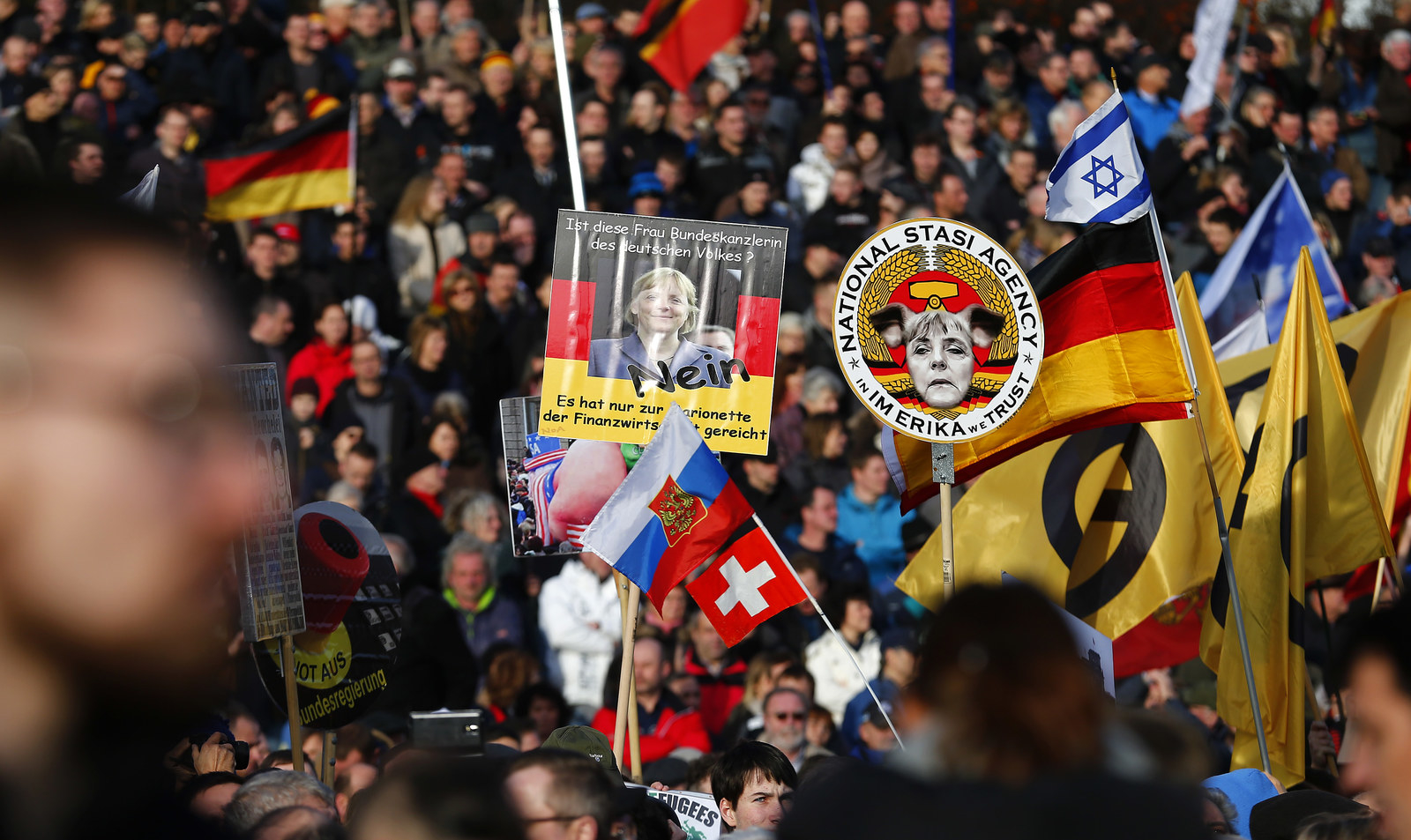
In the months following the decision, Merkel’s popularity dipped. Thousands, mostly members of far-right, Islamophobic, and anti-immigration groups, demonstrated in squares across the country, and nationalist subjects and rhetoric that had been off-limits since the end of the second world war reared their ugly heads again.
Meanwhile, voices within her own ranks called on Merkel to introduce a cap on the number of future arrivals. Several commentators predicted that her political career was drawing to a close.
But Merkel stood firm, and fought back.
The number of arrivals into Europe has dropped significantly compared to two years ago. Systems to handle and process asylum applications more efficiently have been put in place.
Abroad, Merkel has been pushing for more development aid to Africa. At home, integrating hundreds of thousands of people into German society and the country’s job market is an enormous undertaking and remains a work in progress.
Notwithstanding the challenges that remain, Merkel’s ratings have recovered and are now back at pre-crisis levels.
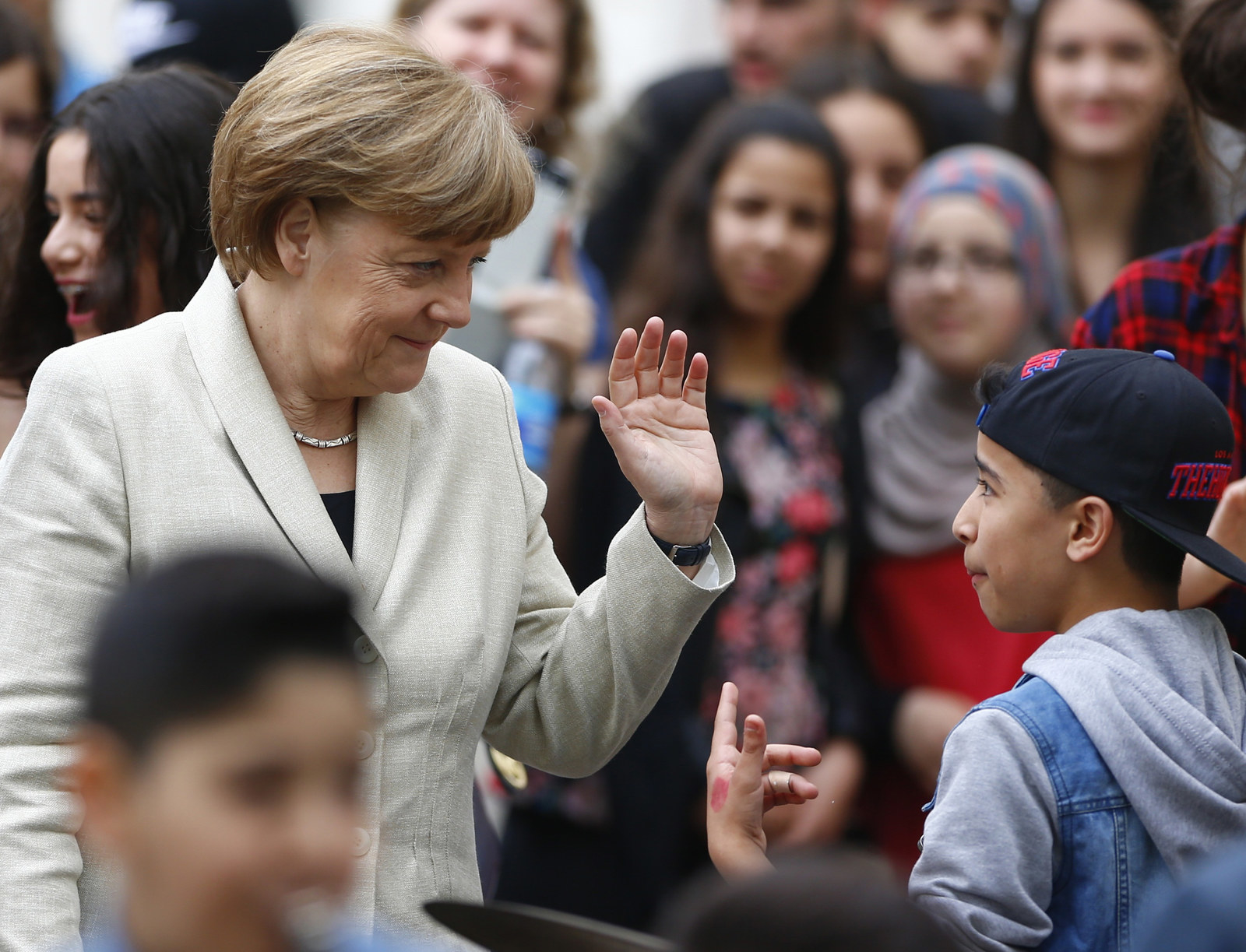
The refugee crisis has only added to Merkel’s moral authority with young Germans. But to fully understand her popularity, it’s essential to know her backstory, which is different from that of every other Western leader.
Her entire education, from her very first day in school through to a degree in physics at Leipzig University and a doctorate in physical chemistry, took place under a Communist dictatorship. She knows better than most what it’s really like to live boxed in behind a wall.
Religion also played a key role in Merkel’s upbringing. Her father was a Lutheran pastor, and as a child she grew up in a seminary on the outskirts of a rural town called Templin, some 80km north of Berlin. The complex of buildings included a home for disabled people. Merkel has recalled that when she would invite her classmates over to play, she sensed that they were scared of the children in the complex. “Sensing this, I would tell my classmates: ‘They're nice people. They're just like us,’" Merkel said in a recently aired documentary about her life.
Merkel was 35 when the Berlin Wall fell, and the effect on her personally was dramatic.
“In the GDR [i.e. East Germany], because of my work in theoretical physical chemistry, I met very few people,” she told a newspaper in an interview last week. “I spent most of the day silent and thinking.”
She added: “When the Wall fell, and I went to Democratic Awakening [a pro-democracy movement], I discovered how much I like talking to other people.”
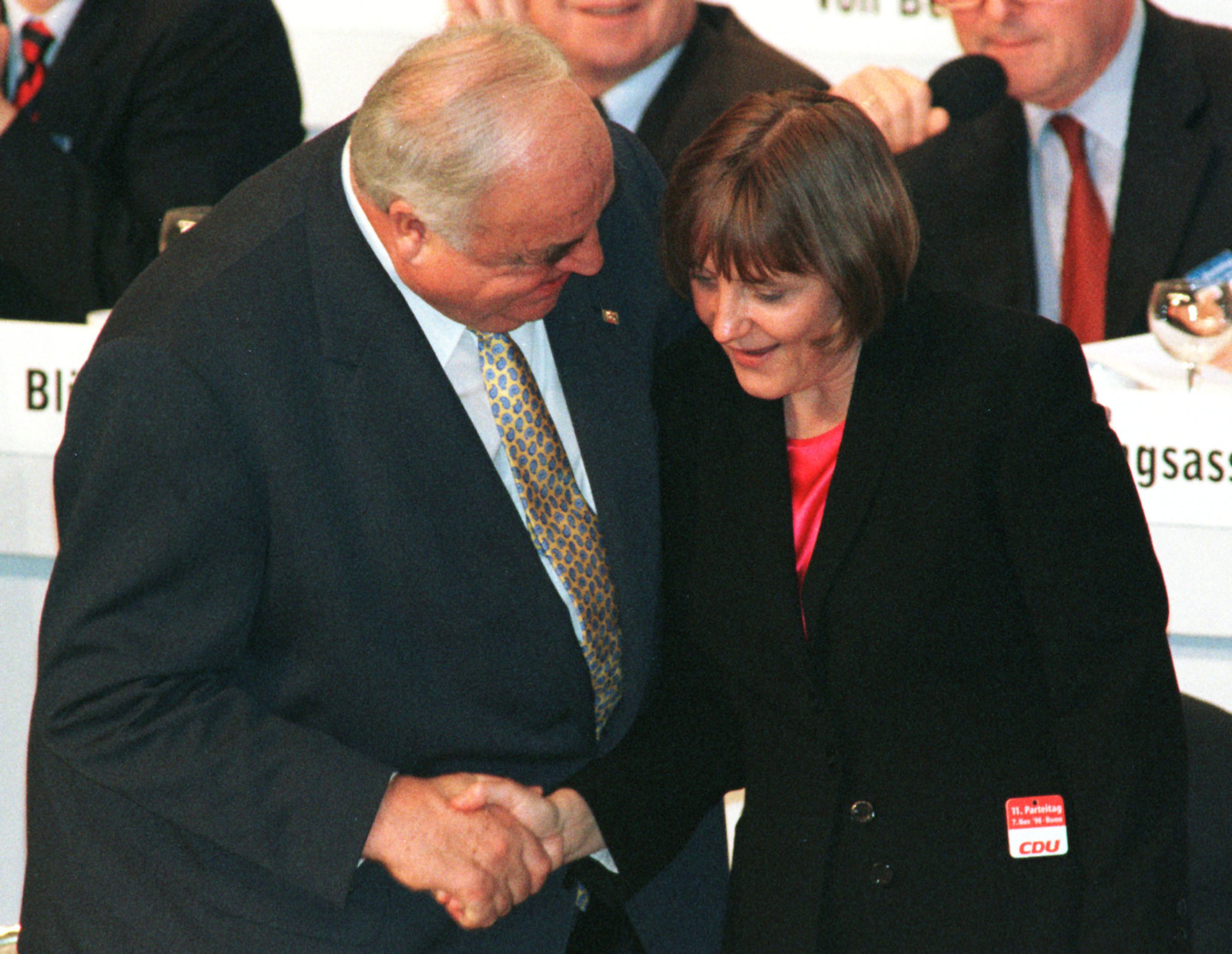
Her experience growing up behind the Iron Curtain has given Merkel an unusually long view of politics. She experienced first-hand the collapse of an old empire. That and a more recent fascination with globalisation make her acutely aware that a country’s wealth, technological advantage, and values should never be taken for granted.
It also informed her approach to the refugee crisis. As an Easterner, Merkel is aware that central and eastern Europe’s alignment to the West’s values and symbols isn’t a given. That's why the attitude adopted today by some central European countries towards people from Muslim-majority countries, and those government’s continued unwillingness to accept any migrants at all because of people’s religion, has particularly upset her.
“That some countries refuse to accept any refugees is not on. That contradicts the spirit of Europe. We’ll overcome that. It will take time and patience but we will succeed,” she said last month.
But Merkel’s critics say Merkel’s longevity is as much to do with her talent for being vague as it is to do with actual policies. In her 12 years in power, Merkel has steered clear from the day-to-day squabbles and scandals of party politics. “Merkel is the Teflon chancellor. Everything slides off her. She doesn’t make mistakes. It’s very frustrating,” an SPD insider told BuzzFeed News.
Merkel’s supporters tend to project whatever they want to hear on to her. To her critics, she is vague, too cautious, and lacks big ideas.
Some political scientists have gone as far as coining a phrase for the way they feel about her politics: “asymmetric demobilisation”, a strategy of lulling voters into a sense of security by blunting potentially contentious issues and neutralising the opposition’s more popular policy positions. They point to how Merkel recently allowed a free parliamentary vote on same-sex marriage as an example of the strategy at work.
"The chancellor has two strengths: One, she takes the popular policies of the Greens, the liberals, and the SPD. Two, she repeats her message all the time: 'Be careful with the money,'" Axel Schäfer, a deputy chairman of the SPD faction of MPs in the Bundestag, told BuzzFeed News.
Merkel’s allies argue that she simply acknowledges reality: The vast majority of Germans, including CDU voters, are in favour of same-sex marriage.
Many of Merkel’s strengths as a politician are intrinsically linked to Germany’s consensus-minded political system.
Bringing different people and viewpoints together works in Germany. The fact that Merkel genuinely enjoys striking compromises helps.
“During our meetings, most other leaders prefer to have high-level political debates,” a senior European government official said. “Merkel focuses discussions on technical conclusions and goals. She will sit there with her pen in hand, remove a sentence, change a paragraph, add or remove words.”
The same official describes Merkel’s way of operating: “Merkel is a phenomenon. First, she breaks every big problem down into small parts. In this way she gets round some issues, and pushes others well into the future. It’s like an algorithm.
“Second, she turns everything into a process. She leads like a teacher: She hands out tasks, everyone has a place, and she knows everyone’s role. Once you’re in her process, it’s done. Third, she never loses her cool."
Another senior European diplomat said: “Merkel knows every dossier, in detail. She is the only leader at international meetings [e.g. G7, G20, NATO summits, European Councils] who could write a communique all by herself. She can change the words in a document because she understands the subtlety of their meaning.”
However, politicians with more energetic ways can find Merkel’s approach frustrating at times. In a book published in July, former Italian prime minister Matteo Renzi, without naming Merkel directly, writes: “Spending entire days arguing over a comma in a document that will be read by fewer people than wrote the document is useless 99% of the time.”
(However, Renzi later adds that Merkel’s mediating helped Italy on a number of occasions.)
One European head of government told BuzzFeed News: “Not everyone likes Merkel, but everyone respects her.”
Merkel’s method of operating would probably not be as effective in more pugilistic and confrontational political environments such as the US and the UK. She goes to great length to get along with people. She doesn’t aggravate, she doesn’t offend, and she's very reflective. As one political commentator recently put it, Merkel’s is “politics without the circus”.

Squeezed between the US's Donald Trump, Russia's Vladimir Putin, and Turkey’s increasingly authoritarian Recep Tayyip Erdogan, Merkel has been defined on occasion as “the leader of the free world”, on others as “the liberal West’s last defender”.
Merkel strongly rejects the “leader of the free world” mantel. The onus is not one for a German leader.
Merkel is often framed in the context of rivalries, contrasting her to the divergent values or weaknesses of others – often macho men, many of whom in the past are said to have underestimated her, and bombastic bullies with large egos. Trump is the latest in a long line.
But the fact that the US president has been a vocal critic of Germany and its chancellor (he called her refugee policy a “catastrophic mistake”) has undoubtedly helped boost Merkel’s ratings at home. Trump’s decision to pull out of the Paris climate deal, and the doubt he casts on the principles that have underpinned decades of US-EU relations, strongly diverges with the vast majority of Germans’ worldview. Some 85% of Germans have a negative opinion of Trump – making him the most unpopular US president in Germany since records began, by far.
Merkel is friendly with other world leaders, but isn’t the type of person that strikes friendships with them. She has her circle of friends, separate from politics, and doesn’t hang out with people outside her circle.
The late Helmut Kohl would take saunas with then Russian president Boris Yeltsin. Silvio Berlusconi and Putin are still friends, meeting up socially a number of times in Russia and Italy, even after the former Italian prime minister left office.
But Merkel has little time for the old boys club often on display in world politics. “Ostentatious machismo” is not to her liking, according to an authorised biography by Stefan Kornelius.
The closest Merkel has come to what some might call a world leader friendship was with Barack Obama. The former US president’s final telephone call with a foreign leader before leaving office was to Merkel, and on his last official overseas trip he stopped by Berlin. Aides remember long chats about strategy and global issues beyond the most pressing current affairs. Earlier this year, Obama returned to Berlin to talk about globalisation with Merkel at an event in front of the Brandenburg Gate.
Some describe the German election’s lack of excitement and controversy as boring – especially compared to recent elections in the US, France, and the UK. German voters wouldn’t have it any other way.
Across the country, Merkel’s campaign posters read: “For a Germany in which we live well and gladly.” On the back of a strong economy – the fastest-growing among the rich group of G7 nations last year – and record low unemployment, most Germans seem content.
Merkel’s party enjoys a 15-point lead over the SPD. If Germans elected their chancellor directly, more than 1 in 2 would vote for her, double Schulz’s support.
But one only needs to look at a map of Europe to understand what is at stake every time Germany elects a new parliament. This year is no different: Ukraine and Russia to the east. Closer to home, Poland and Hungary are stretching the limits of basic democratic principles and the rule of law. A migration crisis to the south. To the west, there is Brexit.
Going into the election, what drives Merkel is Europe’s future. Populist, nationalist, and anti-immigration parties across the continent aren’t an exhausted force.
Merkel is concerned about Germany and Europe’s continued ability to stay relevant in the long run. She worries that Europe could one day become a museum continent, because many of the world’s most important innovations are taking place elsewhere – in South Korea, Silicon Valley, and China, for example.
“We Europeans must take our destiny into our own hands,” she has repeated several times this year.
She sees a similar drive in French president Emmanuel Macron. She admires that he chose to run an election campaign on an unapologetically pro-EU platform and as someone who has little time for partisanship and ideology, she finds his “neither left-wing nor right-wing” politics appealing.
And Merkel knows that any lasting reform to the EU – from greater defence and foreign policy cooperation to further integration in the eurozone and an EU that moves forward at different speeds – must pass through the Germany-France relationship.
A senior French government official who spoke to BuzzFeed News on condition of anonymity said: “Both Germany and France will have a four-year runway until new elections. That’s a good period of time for reforms.”
Merkel, meanwhile, has signalled that she backs Macron’s vision for a eurozone budget and finance minister.
Macron is Merkel’s fourth French president, and her dealings with his predecessors have not always been easy.
When it came to personality, Nicolas Sarkozy, who was known as “president bling-bling”, and Merkel were polar opposites.
Merkel found Sarkozy too impulsive and impatient. Sarkozy found her cold, too slow to act, and frustratingly cautious. In 2008, at a press conference in the midst of a global financial crisis, he said: “France is acting, while Germany is only thinking about it!”
Where Merkel saw complexity, Sarkozy saw attempts to block much-needed action. He was infuriated by Germany’s decision to abstain during a UN security council vote on intervention in Libya.
The journalist Marion Van Renterghem, who recently published a book about Merkel, has written of a private exchange between the two leaders. "You reproach me for being too slow," Merkel is said to have told Sarkozy over dinner. “I do not have the same relationship to time as you. I went into politics late, and I did not even imagine it was possible. I was in the GDR, I was thinking of staying there until retirement, and then finishing my days in West Germany. The fall of the Wall was brutal. I am someone who gives time to time because I have seen that in slowness there is hope.”
Still, despite all their differences, Merkel and Sarkozy weathered the global financial crisis.
For someone who doesn’t often give way to emotion in public (her love of football being a rare exception), Merkel almost showed enthusiasm for Macron’s election victory. When the two leaders met in Berlin immediately after Macron’s inauguration, Merkel quoted the author Hermann Hesse: “There is magic in every beginning.”
“The magic lasts only when there are results,” Merkel, who has seen 100 EU leaders come and go, added cautiously.
Some claim Merkel developed a passion for Europe late in her career, that unlike previous (West) German chancellors, the EU isn’t in her DNA.
Merkel dismisses such suggestions. “I did not become European. I have always been a European,” she said in a recent interview.
Despite having been in the public eye for more than two decades, there is much about Merkel that remains unknown.
There is rarely a glimpse into her private life beyond the occasional photograph shopping in a supermarket or the sharing of a potato soup recipe.
Legacy is not something that is said to concern Merkel much. There will come a day when she will decide it’s time to go. Those closest to her would not be too surprised if when that day comes she simply cleans out her desk, says thank you, and departs.
But if she has her way on Sunday, that day will remain distant, and she’ll have a new generation of voters. Like Elisabeth Pfaffendorf, a 24-year old medicine student who tells BuzzFeed News in Heidelberg that she only votes for the CDU because of Merkel.
“I have the feeling that what she says is really important to her personally,” Pfaffendorf says. “She thinks long-term rather than firing all over the place. She gives me the feeling that she has a plan.”

